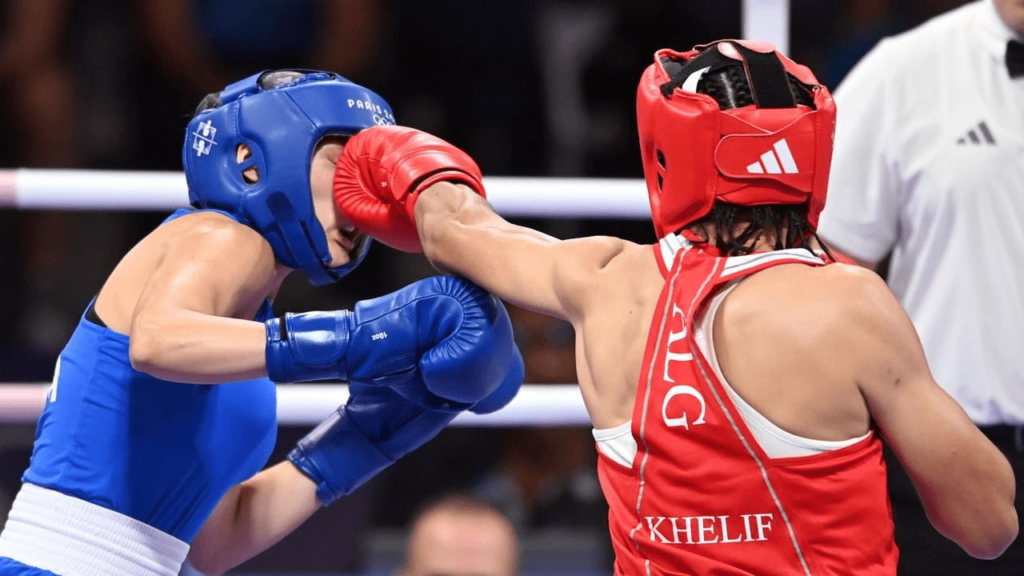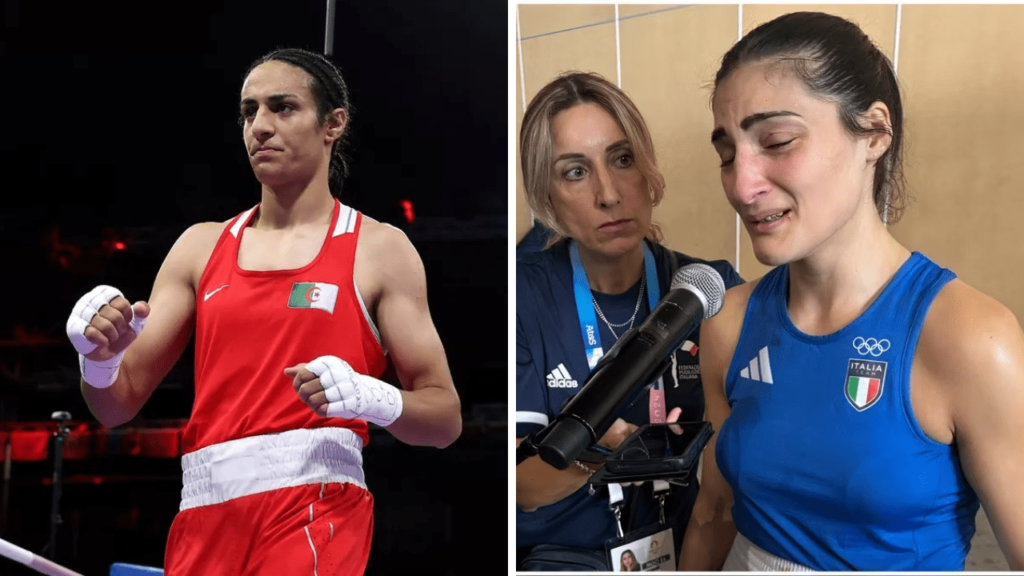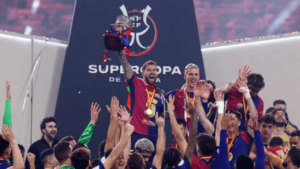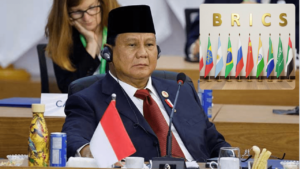The Paris Olympics 2024 witnessed a significant moment when Italian boxer Angela Carini withdrew from her match against Algerian boxer Imane Khelif, reigniting the global debate on gender eligibility in sports.

The Olympic Games, a celebration of global sportsmanship and excellence, have also become a platform for significant social and political debates. One such debate revolves around gender eligibility in sports, an issue that has garnered intense scrutiny and polarized opinions. The recent incident involving Italian boxer Angela Carini and Algerian boxer Imane Khelif at the Paris Olympics 2024 has brought this contentious topic back into the limelight. Carini’s withdrawal from her match against Khelif has sparked widespread discussion about fairness, inclusion, and the integrity of women’s sports.
Key Events Leading Up to the Controversy
Angela Carini, an accomplished Italian boxer, withdrew from her Olympic match against Algeria’s Imane Khelif after sustaining a severe punch to the nose. Carini stated that she had never experienced such a forceful punch in her career, prompting her decision to exit the match. This incident occurred in the context of Khelif’s controversial history regarding gender eligibility.
Imane Khelif had been disqualified from the 2023 International Boxing Association (IBA) World Boxing Championships due to failing to meet the eligibility requirements for the women’s competition. The IBA’s decision was based on a confidential test that suggested Khelif had competitive advantages over other female athletes. Despite this, the International Olympic Committee (IOC) allowed Khelif to compete in the Paris Olympics, defending her right to participate and criticizing the IBA’s disqualification as sudden and arbitrary.
Imane Khelif’s Gender Eligibility Controversy
The core of the controversy lies in the IBA’s disqualification of Khelif from the World Boxing Championships. According to IBA president Umar Kremlev, Khelif’s disqualification was due to the discovery of XY chromosomes, a characteristic typically associated with males. This revelation led to Khelif being barred from the championships, as the IBA deemed her ineligible for the women’s competition.
However, the IOC maintained a different stance. They emphasized that Khelif’s participation in the Olympics was in line with their guidelines, which do not specifically require testosterone testing or other gender-specific criteria beyond a general eligibility test. The IOC’s support for Khelif’s inclusion was based on the principle of non-discrimination and the belief that all athletes should have the right to compete.
Reactions and Public Outcry
The incident involving Carini and Khelif ignited a firestorm of reactions from various quarters. Italian Prime Minister Giorgia Meloni expressed her concerns, stating that athletes with male genetic characteristics should not be allowed in women’s competitions to ensure fairness. This sentiment was echoed by several public figures, including Elon Musk and J.K. Rowling, who criticized the decision to allow Khelif to compete.
On the other hand, Khelif received support from her fellow Algerians. Algerian national soccer player Ismaël Bennacer tweeted in defense of Khelif, highlighting her talent and hard work. Khelif herself has spoken out against her disqualification from the IBA championships, describing it as part of a larger conspiracy against her.

The Broader Context of Gender Eligibility in Sports
The debate over gender eligibility in sports is not new, and it encompasses complex issues of gender identity, biological differences, and the quest for fairness. Critics argue that allowing athletes with male genetic characteristics or elevated testosterone levels to compete in women’s sports creates an uneven playing field. They contend that these athletes possess inherent physical advantages that compromise the integrity of women’s competitions.
Supporters of inclusive policies, however, emphasize the importance of allowing all athletes to compete regardless of their genetic or hormonal makeup. They argue that excluding athletes based on these criteria is discriminatory and undermines the principle of equal opportunity in sports.
The IOC has a complicated history with gender testing. Sex testing for female athletes began in 1968 but was officially discontinued in 1999. The current guidelines are less specific, stating that “gender tests may be conducted” but without detailed criteria for testosterone levels or other markers of gender eligibility. This lack of clarity has contributed to the ongoing controversy and differing interpretations by various sports organizations.
The Impact on Women’s Boxing and Future Implications
The incident at the Paris Olympics has significant implications for women’s boxing and the broader sports community. Angela Carini’s withdrawal not only underscores the physical and emotional toll on athletes caught in the midst of this debate but also raises questions about the criteria used to determine eligibility.
As Khelif prepares to face Hungary’s Anna Luca Hamori in the next round, the focus will undoubtedly remain on the broader implications of her participation. Hamori has stated that she is indifferent to the controversy, focusing solely on her performance. However, the outcome of this match and Khelif’s continued presence in the competition will likely influence future policies and discussions regarding gender eligibility in sports.
A Quick Review
The case of Angela Carini and Imane Khelif at the Paris Olympics exemplifies the ongoing and multifaceted debate over gender eligibility in sports. It highlights the challenges of balancing fairness, inclusion, and the integrity of women’s competitions. As sports organizations continue to navigate these complex issues, the discussions and decisions made will undoubtedly shape the future landscape of women’s sports.
This incident serves as a reminder of the need for clear, fair, and inclusive policies that respect the rights of all athletes while ensuring a level playing field. The sports world will be watching closely as the debate evolves, hoping for resolutions that uphold the principles of both competition and equality.
Read Next:

The Psychology of Love: Why Valentines Day Matters More Epic Than You Think
Discover the psychology of love and why Valentines Day is more important than you think. Learn how love impacts the brain, strengthens relationships, and boosts

Premier League Highlights: Arsenal Humiliate Man City 5-1, Spurs and Palace Secure Crucial Wins
Arsenal demolished Manchester City 5-1 in a statement premier league highlights win, reigniting their title hopes. Meanwhile, Crystal Palace stunned Man United 2-0, and Tottenham

How Budget 2025 Impacts the Indian Middle-Class: Major Tax Benefits and Glaring Omissions
Budget 2025 offers major tax relief to the middle class, including zero tax on incomes up to ₹12 lakh. However, it misses out on incentives

Degrees vs Employability: Why “Highly Qualified Degree Holders” Struggle to Find Jobs While “Less Qualified Individuals” Get Hired Faster!
Many highly qualified individuals struggle to secure jobs, while less qualified candidates get hired quickly. This Degrees vs Employability paradox is caused by employer preferences,

The Power of Mindset: Why Looking Poor Doesn’t Make You Poor, but Thinking Poor Does!
Discover why looking poor doesn’t define your wealth but thinking poor does. Learn the power of mindset and how a growth-oriented mindset can lead to

Overthinking: How It’s Damaging Today’s Youth – Causes and Cure in 2025
Understanding how overthinking is silently damaging today’s youth, from its causes rooted in societal pressure and social media to its long-term effects on mental health.

Netaji Subhash Chandra Bose: An Epitome of Epic Leadership
Discovering the incredible life of Netaji Subhash Chandra Bose, a leader whose vision, courage, and determination redefined India’s freedom struggle. Explore his leadership qualities, ideology,

Global News Headlines Today: From Gaza Ceasefire to Blue Origin’s Massive 2025 Milestone
Explore today’s top global news headlines, from the Gaza ceasefire and Blue Origin’s historic spaceflight to Apple losing its top spot in China’s smartphone market.

The Hidden Danger of Social Media Nudity: A Threat to Today’s Youth in 2025
Understanding how social media nudity is impacting the youth and their future potential. Learn about the risks of unregulated content, cultural sensitivities, and solutions for

FA Cup 2024: Manchester United Survive Arsenal Test to Advance in FA Cup Fourth Round
Manchester United defeated Arsenal in a thrilling FA Cup third-round encounter, with Atlay Bayindir’s heroics sealing the win. Read about key moments, standout performances, and

Supercopa de España: Barcelona Dominate Real Madrid 5-2 to Claim Supercup
Barcelona delivered a stunning 5-2 victory over Real Madrid in the Supercopa de España final. Read about the key moments, star players, and the significance

Global News Highlights Today: India’s Metro Milestone, US Aid Shift, iOS Stunning Updates and More!
Explore today’s global news highlights, including the Tibet earthquake, political tensions in South Korea, LA wildfires, US aid shifts, and India’s metro milestone. Stay informed

The Power of Keeping Plans Private in 2025: Why Silence is the Key to Achieving Your Dreams!
Discover why keeping plans private is crucial for achieving your dreams. Learn how silence boosts focus, protects momentum, and helps you achieve success without distractions

Rolls-Royce Ghost Series II Arrives in India 2025: Elegance Meets Stunning Innovation
Discover the all-new Rolls-Royce Ghost Series II launched in India, priced from ₹8.95 crore. Explore its stunning design, luxurious interior, enhanced tech features, and powerful

Global News Highlights: Earthquakes in Tibet, US Bird Flu Crisis Fatality, Brics Welcomes Indonesia in 2025, and Many more
Explore this week’s global news highlights, including the first bird flu death in the US, Indonesia joining Brics, devastating earthquakes in Tibet, rising HMPV cases
